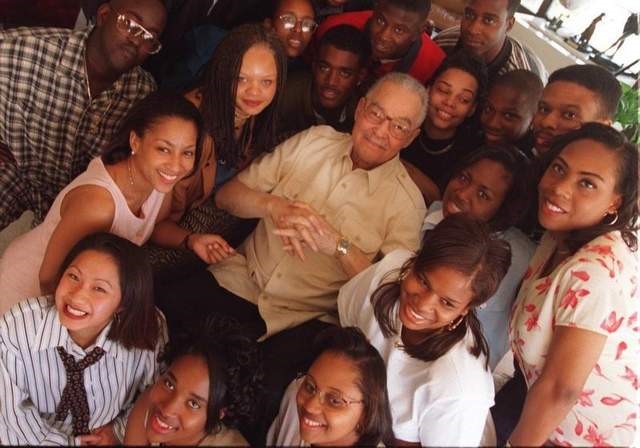Coleman A. Young1918-1997
Coleman A. Young is one of the most important African-American political pioneers in history.
|
Pre-Politics (1918-1960)
Birth to High School |
Coleman Young was born in Tuscaloosa, Alabama in 1918. He was the oldest of five children born to William Coleman Young, who worked as a barber, and Ida Reese Jones Young, a teacher.
The family left for Detroit by train on in 1923. They settled in Black Bottom, an east-side area named for the richness of its soil. Blacks coming from the South seeking work in the auto industry were segregated into the crowded but vibrant neighborhood. Young was one of the top students in the Catholic school system, but his scholarship to a Catholic high school was rescinded when a priest learned that the light- skinned youngster was black. Young attended Eastern High School instead and graduated second in his class. Young was offered an academic scholarship to the University of Michigan but, Because he was black, was not offered room and board. Because of this, he declined to enroll. (One of the reasons Mayor Young founded CAYF was to give others opportunities denied to him.) |
After High School |
Young worked for Ford Motor, but agitated management with his union organizing activity and found himself blacklisted from working in the industry. The FBI also opened a case file on him. Young became deeply involved in the labor movement and became the first black official in the CIO. His slogan was: "Black and white unite to fight". Young believed that the struggle for workers' rights and the struggle for black civil rights were essentially connected.
Young was drafted for WWII and was a lieutenant with the legendary Tuskegee Airmen. Young was arrested with 100 other black officers after trying to integrate an officers club. The officers were later released. After the war, Young's organizing work was monitored by the federal government who, in the 1950s, were in the throes of an anti-Communist witchhunt that sought to ensnare anyone working in the labor or civil rights movements. In 1952 Young was ordered to appear before the House Un-American Activities Committee. He became the first witness to confront the committee, calling it "un-American." Young's testimony was radiocast in Detroit and he became a local hero. In the 1950s, Coleman Young struggled to earn a living. He was blacklisted by both private industry and the FBI for his union activities. So he worked as a dry cleaner, wall washer, taxi driver and other unsteady jobs. When his wife Marion was pregnant and had a complication, they could not afford the medical care. The child was lost and the marriage would later collapse. |
Political Career (1960s - 1997)
The Beginning |
Young entered election politics in 1960s. At the '61 Michigan Constitutional Convention, he co-wrote the civil rights section of the new state constitution. In '64 he was elected as a State Senator and rose to Democratic floor leader two years later. His colleagues regarded him as both a fiery and astute politician who understood the art of coalition building. In '68 Young became the first black member of the Democratic National Committee.
|
Mayor Young |
Young was elected Mayor of Detroit in 1973. In his campaign he vowed to fully integrate the police force and work to end police brutality against black citizens that was endemic in the city. Police brutality sparked the 1967 riot that accelerated white flight which made blacks a majority in the city.
Detroit was in dire times when Young assumed office. The flight of people, capital and jobs combined with the decline of the domestic auto industry and the oil embargo exacted a heavy toll on the city. Young set out to create new partner ships with corporate leaders, like Henry Ford II, to try to rebuild the economic base of the city. As a result of the Mayor's efforts, Ford built the Renaissance Center on the riverfront and both GM and Chrysler built new plants in Detroit. |
Accomplishments |
Mayor Young was elected five times. Among his many accomplishments:
|


